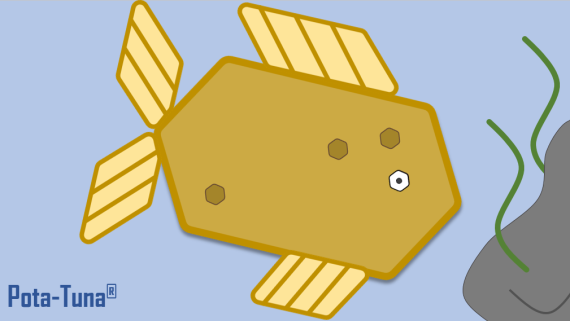‘We had to come up with a plan to make the potato plant more sustainable and with ways to fully valorise the potato’, says Curubeto. ‘Avebe is already known for that, but they want to improve valorisation in the coming years.’
The students of Curubeto’s group ‘Ave-to-be’ focused on the transition to a more plant-based diet. ‘The demand for plant-based products is rising, so one of the things we did was explore the potential of potatoes as a protein crop. Soy is a crop that is high in protein; almost forty per cent of the soybean is protein. The potato has only about two per cent protein. But we found out that, per acre, the amount of protein is similar. That is because you can produce much more kilos of potatoes per acre than kilos of soybeans. Which means that, if you can smartly extract this potato protein, you can see the potato as a protein crop.’
Potato fish
Avebe already produces potato protein. By critically looking at potato science, Curubeto’s group found a way to increase the amount of protein extraction from potatoes as well as finding new possibilities for extracting healthy fats (omega 3 and 6) and amino acids, which can be used as flavor enhancers or food supplements. ‘This can be achieved by switching to a more innovative filtration system.’ Then the students combined their findings into an idea for a new product: the potato fish.
‘Fish is rich in proteins and healthy fats like omega 3 and 6. Since we can extract those from potatoes, it is possible to create a plant-based product that, in its nutritional values, is similar to fish. We can use the amino acids as a flavor enhancer, to make it taste like fish as well.’
Reusing potato-water
Curubeto’s group also looked at how the water and energy consumption of the potato plant could be minimised. ‘During the course Sustainability in Food and Bio-Processing, I learned about drying food products. The potato consists of 70 per cent water. By using a drying technique that captures water instead of releasing it into the atmosphere, this water can be used in other processes in the same factory.’
The jury praised the integrated approach of Curubeto’s team. All team members received a European tuition fee (2083 euros). ‘The prize money will go to my family. They supported me so I can study here, this is a way I can thank them.’


 Pota-Tuna, the potato fish. Photo: Nicolas Curubeto
Pota-Tuna, the potato fish. Photo: Nicolas Curubeto